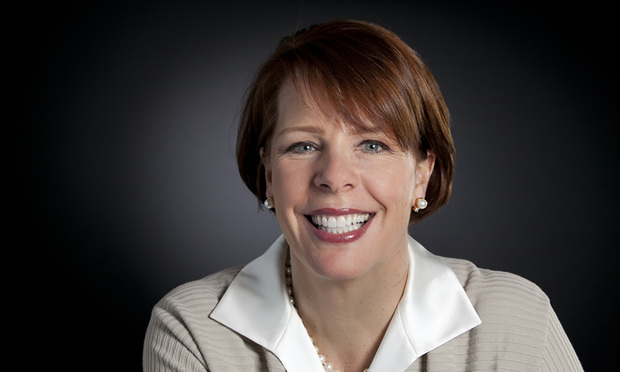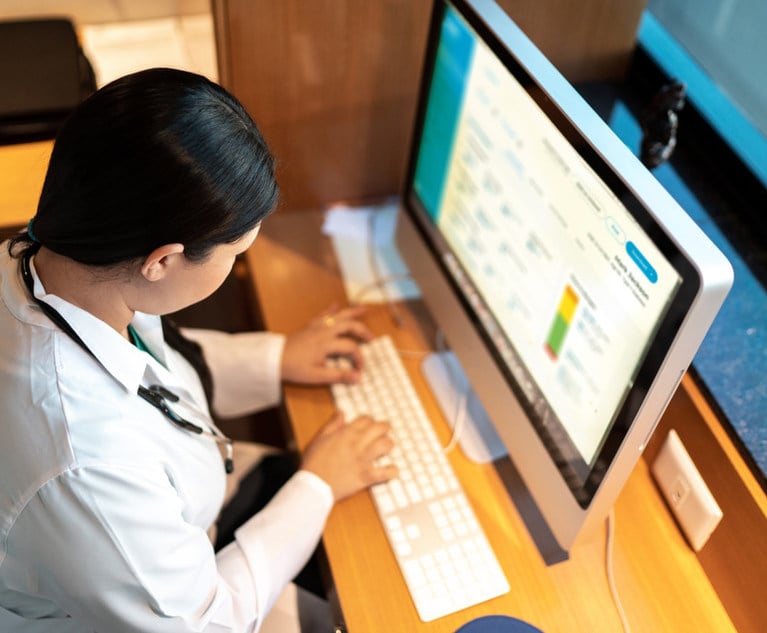CLOC's New Executive Director Talks the Future of In-Person Legal Conferences
Betsi Roach, CLOC's first executive director, is helping the organization develop its approach to an increasingly crowded virtual conference landscape and offers thoughts on how online and physical conferences may co-exist in the future.
May 28, 2020 at 02:50 PM
5 minute read
 Betsi Roach, executive director of CLOC.
Betsi Roach, executive director of CLOC.
Last week it was announced that Betsi Roach would be joining the Corporate Legal Operations Consortium as the organization's first executive director, a role that will find her looking to expand the organization's membership, content and digital footprint at a time when COVID-19 has thrust much of the legal industry into the virtual realm.
CLOC's annual Las Vegas Institute, for instance, was canceled in response to the pandemic and replaced with a series of ongoing webinars that will continue to unfold throughout the month of June. Upcoming topics include legal project management, outside counsel spend, maturity planning and maximizing spend.
While Roach, who has previously served as the executive director of the Legal Marketing Association and as the director of the section of intellectual property law at the American Bar Association, does expect in-person events to return at some point. However she also sees the addition of a virtual component to such activities as a way to expand the guest list to include people who might otherwise be unable to travel.
In the meantime, it looks like CLOC—and other organizations—will be continuing to experiment with how virtual event formats can be tweaked to promote maximum audience participation.
Corporate Counsel: CLOC launched an ongoing series of webinars after COVID-19 forced the organization to cancel its annual Las Vegas Institute. What has the response been so far?
Betsi Roach: People are clearly hungry for the content. Last Thursday when Jason Barnwell, Jae Um and Ed Sohn held a webinar, hundreds of people signed up within the first hour. There were over 1,300 people that were registered for the final event. We're really excited about the receptivity.
CC: Do you anticipate trying to fold more webinars into CLOC's programming?
BR: We do want to look at how do we break our dependence on in-person events. Those are always going to be part of our strategy. What the COVID-19 pandemic has really brought for us and many organizations is an opportunity to help change on how our members meet and focus and do more online like our webinars.
CC: People are on their computers so much these days. They have to do video conferences, they have to do virtual meetings. How do you combat virtual burnout?
BR: That is really an issue. And so one of the things that we are starting to talk about in designing a bigger virtual event is what is palatable for people? It's like 90 minutes when you are in person is kind of the max. Well, you've got to shorten that for online because of the burnout and the ability for people to multitask more than ever. We're kind of thinking 45 minutes. What does that look like? Does that mean it's a 20-minute presentation and then 25 minutes for Q&A? We're still talking that through because one of things we're realizing is that the Q&A portion is also where there's a lot of great information.
CC: Will you continue to build video into online events and presentations?
BR: Video is always going to be an important factor however we use it. We haven't gotten to this detail yet but from some associations that I've talked with, other association professionals and even events that I've been on over the last couple of months, there's a real benefit to those prerecorded presentations. That allows the presenter or presenters to be a part of the chat that goes along with the presentation. It frees up the presenter a little bit to help address the questions that come in on the chat from the Q&A features.
CC: Networking is a huge part of the conference experience. How do you recreate something like that in a virtual space?
BR: Most of these [conferencing] platforms have this ability built in so that you can have the breakout rooms that focus on a specific topic or question. And we will need to be doing a lot of prep with our facilitators or speakers to facilitate that conversation because sometimes people are multitasking or they are just not paying attention. Everybody is busy and so how can we make sure that those smaller opportunities to connect are still there? We're also looking at what that means for the vendors or the service providers. Do people sign up for time to talk with them?
CC: Once there is some recovery and lockdown restrictions are lifted, do you think that physical conferences will make a full comeback?
BR: I don't know when, and I know it will be a while, but I really believe in-person events will come back and they will continue to be a part of an organization like CLOC's future. Again, I'm new, but I really believe that. And this has given CLOC to ramp up and save what could be years to try a hybrid model. To me, that's really exciting. Not everybody is able to get to an in-person event, and I really think and want to push for some type of hybrid event going forward where we can continue at a reasonable cost to meet the needs of people that are in-person at the conference as well as some type of broadcast for certain events—whether it's all or some—so that people who can't make it [to an event] in person can still get some of the great content that's there.
This content has been archived. It is available through our partners, LexisNexis® and Bloomberg Law.
To view this content, please continue to their sites.
Not a Lexis Subscriber?
Subscribe Now
Not a Bloomberg Law Subscriber?
Subscribe Now
NOT FOR REPRINT
© 2025 ALM Global, LLC, All Rights Reserved. Request academic re-use from www.copyright.com. All other uses, submit a request to [email protected]. For more information visit Asset & Logo Licensing.
You Might Like
View All

After Botched Landing of United Airlines Boeing 767, Unlikely Plaintiff Sues Carrier
5 minute read
Inside Track: Why Relentless Self-Promoters Need Not Apply for GC Posts

Trending Stories
Who Got The Work
J. Brugh Lower of Gibbons has entered an appearance for industrial equipment supplier Devco Corporation in a pending trademark infringement lawsuit. The suit, accusing the defendant of selling knock-off Graco products, was filed Dec. 18 in New Jersey District Court by Rivkin Radler on behalf of Graco Inc. and Graco Minnesota. The case, assigned to U.S. District Judge Zahid N. Quraishi, is 3:24-cv-11294, Graco Inc. et al v. Devco Corporation.
Who Got The Work
Rebecca Maller-Stein and Kent A. Yalowitz of Arnold & Porter Kaye Scholer have entered their appearances for Hanaco Venture Capital and its executives, Lior Prosor and David Frankel, in a pending securities lawsuit. The action, filed on Dec. 24 in New York Southern District Court by Zell, Aron & Co. on behalf of Goldeneye Advisors, accuses the defendants of negligently and fraudulently managing the plaintiff's $1 million investment. The case, assigned to U.S. District Judge Vernon S. Broderick, is 1:24-cv-09918, Goldeneye Advisors, LLC v. Hanaco Venture Capital, Ltd. et al.
Who Got The Work
Attorneys from A&O Shearman has stepped in as defense counsel for Toronto-Dominion Bank and other defendants in a pending securities class action. The suit, filed Dec. 11 in New York Southern District Court by Bleichmar Fonti & Auld, accuses the defendants of concealing the bank's 'pervasive' deficiencies in regards to its compliance with the Bank Secrecy Act and the quality of its anti-money laundering controls. The case, assigned to U.S. District Judge Arun Subramanian, is 1:24-cv-09445, Gonzalez v. The Toronto-Dominion Bank et al.
Who Got The Work
Crown Castle International, a Pennsylvania company providing shared communications infrastructure, has turned to Luke D. Wolf of Gordon Rees Scully Mansukhani to fend off a pending breach-of-contract lawsuit. The court action, filed Nov. 25 in Michigan Eastern District Court by Hooper Hathaway PC on behalf of The Town Residences LLC, accuses Crown Castle of failing to transfer approximately $30,000 in utility payments from T-Mobile in breach of a roof-top lease and assignment agreement. The case, assigned to U.S. District Judge Susan K. Declercq, is 2:24-cv-13131, The Town Residences LLC v. T-Mobile US, Inc. et al.
Who Got The Work
Wilfred P. Coronato and Daniel M. Schwartz of McCarter & English have stepped in as defense counsel to Electrolux Home Products Inc. in a pending product liability lawsuit. The court action, filed Nov. 26 in New York Eastern District Court by Poulos Lopiccolo PC and Nagel Rice LLP on behalf of David Stern, alleges that the defendant's refrigerators’ drawers and shelving repeatedly break and fall apart within months after purchase. The case, assigned to U.S. District Judge Joan M. Azrack, is 2:24-cv-08204, Stern v. Electrolux Home Products, Inc.
Featured Firms
Law Offices of Gary Martin Hays & Associates, P.C.
(470) 294-1674
Law Offices of Mark E. Salomone
(857) 444-6468
Smith & Hassler
(713) 739-1250






